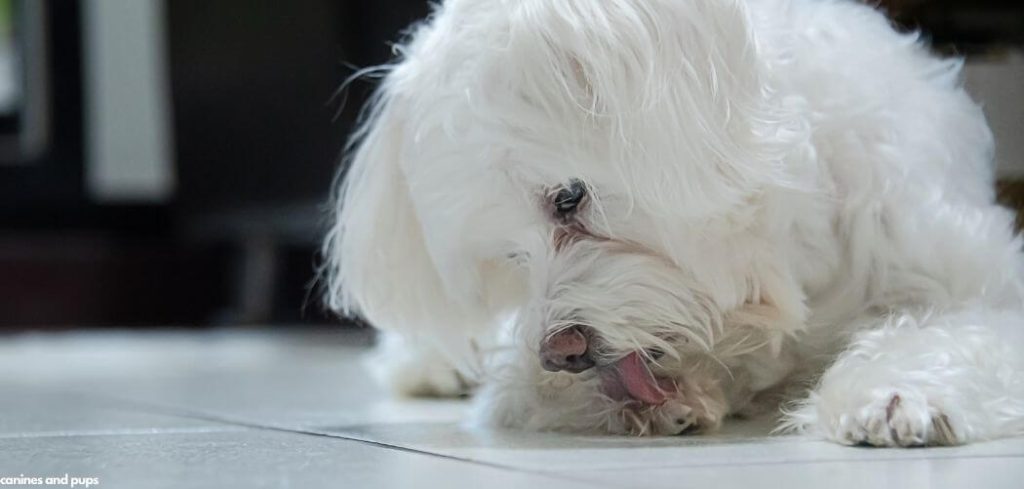A dog excessively licking and swallowing can be worrying for any dog owner, as it may indicate underlying health issues or behavioral problems.
When a dog frequently licks and swallows, it’s important to pay attention to accompanying symptoms and patterns to ensure prompt care.
We outline the common reasons why a dog may excessively lick and swallow, what you can do at home, and when to seek veterinary help.
Dog Excessively Licking and Swallowing — Why It Happens
Excessive licking and swallowing in dogs often stems from a combination of physical discomfort, stress, or behavioral tendencies. Common causes include gastrointestinal upset, dental issues, nausea, allergies, and anxiety. Some dogs develop compulsive licking behaviors due to boredom or environmental stressors.
Understanding the cause is crucial because persistent licking can lead to further complications, including irritation of the mouth and digestive issues.
The behavior may also signal an underlying medical condition that requires attention.

Dog Excessively Licking and Swallowing: Common Causes
Gastrointestinal Upset
When a dog experiences gastrointestinal upset, such as acid reflux, nausea, or stomach irritation, it may lick its lips and swallow frequently.
This behavior is a natural response to nausea or discomfort in the digestive tract. Owners might notice drooling, a lack of appetite, or occasional vomiting alongside the licking.
Gastrointestinal issues can be serious if prolonged, leading to dehydration, nutrient deficiencies, or worsening digestive conditions.
Read more: Dog Keeps Licking Paw But Nothing There (Here’s why)
Dental Problems
Dental disease, including gingivitis, tooth decay, or oral infections, often causes dogs to lick and swallow excessively.
Pain in the mouth or gums can make licking a soothing action, while swallowing may help alleviate the discomfort. Signs to watch for include bad breath, red or swollen gums, and reluctance to chew.
Dental problems are serious because untreated infections can spread to other organs and impact overall health.
Nausea and Motion Sickness
Dogs feeling nauseous, whether from motion sickness, dietary indiscretion, or illness, often respond by licking their lips and swallowing.
This is a natural reflex to manage queasiness and protect the throat from stomach acid.
Other symptoms may include lethargy, drooling, and restlessness. Nausea is a serious concern when persistent, as it can signal more severe conditions like pancreatitis or kidney disease.
Allergies
Environmental or food allergies can trigger excessive licking and swallowing. Allergens can cause oral or gastrointestinal irritation, leading to discomfort and repeated licking.
Signs of allergies might include itching, skin redness, ear infections, or watery eyes.
Allergic reactions are significant because they can lead to secondary infections and chronic discomfort if not addressed.
Anxiety or Stress
Behavioral causes such as anxiety or stress often manifest through repetitive licking and swallowing.
Dogs may develop compulsive behaviors when faced with changes in routine, loud noises, or separation anxiety. Accompanying signs include pacing, whining, or restlessness.
Chronic stress behaviors are serious because they can escalate into self-injury or affect the dog’s overall well-being.
Oral Foreign Bodies
Sometimes dogs excessively lick and swallow due to a foreign object lodged in the mouth or throat.
Small sticks, toys, or debris can cause discomfort, prompting repetitive licking and swallowing attempts.
Look for gagging, pawing at the mouth, or sudden drooling. This situation is urgent because a lodged object can obstruct breathing or cause severe injury.
Read more: Dog Licking Front Paws Excessively] (Here’s why)
What to Do If Your Dog Is Excessively Licking and Swallowing
Monitor your dog closely and keep a log of when the licking and swallowing occurs.
Note patterns related to meals, walks, or stressful events. This information is helpful for your veterinarian.
Ensure your dog’s environment is calm and stress-free. Provide toys, puzzles, and interactive activities to reduce boredom and prevent compulsive behaviors.
Check the dog’s diet and feeding habits. Avoid sudden changes in food and provide small, frequent meals if gastrointestinal upset is suspected.
Maintain proper dental hygiene by brushing your dog’s teeth regularly and providing dental chews. This can alleviate discomfort and reduce the licking behavior.
Observe for any additional symptoms like vomiting, lethargy, or changes in appetite. Addressing these early can prevent the condition from worsening.
When to Call or Visit Your Vet
Seek immediate veterinary care if your dog shows persistent drooling, gagging, vomiting, or signs of pain in the mouth. Rapid response is crucial if a foreign object is suspected.
Contact a vet if you notice changes in appetite, lethargy, weight loss, or behavioral changes. These may indicate underlying medical conditions such as gastrointestinal issues, organ disease, or systemic infection.
Consult a veterinarian for ongoing compulsive licking behaviors that do not respond to at-home care. Behavioral intervention and possible medication may be needed for chronic anxiety or stress-related licking.
Read more: Dog Excessively Licking (Here’s Why)
Key Takeaway
Excessive licking and swallowing in dogs can indicate a variety of medical or behavioral issues.
Paying close attention to patterns, accompanying symptoms, and environmental factors is key.
At-home care includes monitoring behavior, reducing stress, maintaining dental hygiene, and adjusting diet. However, persistent or severe cases require veterinary evaluation to ensure your dog’s health and comfort.
Acting early and thoughtfully can prevent complications and improve your pet’s quality of life.
